Comprehensive Guide to Garden Maintenance in Chelsea
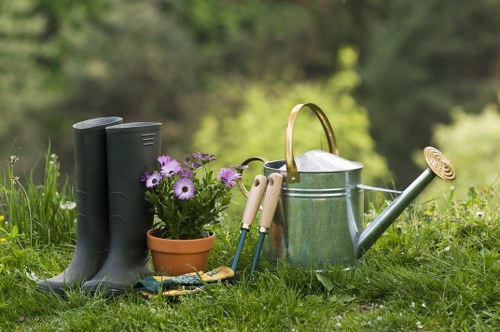
Introduction to Garden Maintenance in Chelsea
Maintaining a beautiful garden in Chelsea requires dedication, knowledge, and the right strategies. Whether you're a seasoned gardener or a newcomer, understanding the unique challenges and opportunities in Chelsea's climate and soil is essential. This guide will walk you through the best practices for garden maintenance in Chelsea, ensuring your outdoor space remains vibrant and healthy all year round.
Garden maintenance is not just about aesthetics; it's also about creating a sustainable environment that supports local wildlife and promotes biodiversity. By implementing effective maintenance techniques, you can enhance the overall health of your garden, reduce pests, and save on long-term costs.
In this article, we'll cover various aspects of garden maintenance, from seasonal tasks to choosing the right plants and tools. Let's embark on a journey to transform your Chelsea garden into a thriving oasis.
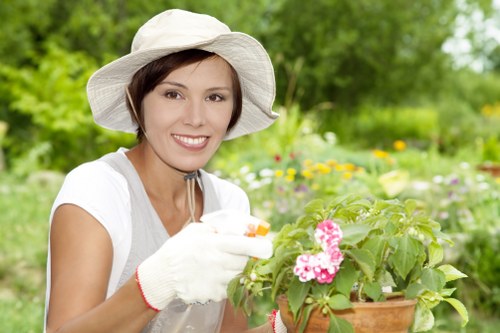
Seasonal Garden Maintenance
Spring Maintenance
Spring is a crucial time for garden maintenance in Chelsea. As the weather warms up, it's the perfect opportunity to prepare your garden for the growing season. Start by cleaning up any debris left from winter, such as fallen leaves and dead plants.
Pruning is another essential spring task. Remove any dead or damaged branches to encourage healthy growth. Additionally, consider planting early-season flowers and vegetables to take advantage of the favorable temperatures.
Don't forget to fertilize your garden beds to provide necessary nutrients for your plants. Using organic fertilizers can promote sustainable growth and improve soil health.
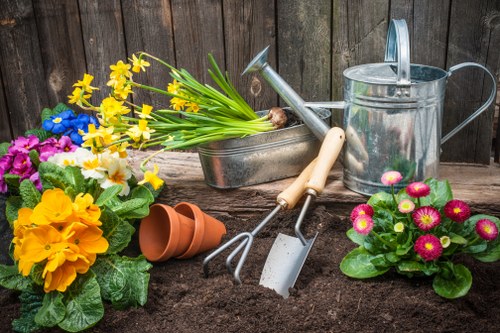
Summer Maintenance
During the summer months, garden maintenance in Chelsea focuses on watering, weeding, and pest control. Ensure your plants receive adequate water, especially during dry spells. Drip irrigation systems can be an efficient way to manage watering needs.
Weeding is essential to prevent unwanted plants from competing with your garden's flora. Regularly inspect your garden beds and remove any invasive species promptly.
Pest management is also critical in the summer. Use natural pest control methods, such as introducing beneficial insects or using organic sprays, to protect your plants without harming the environment.
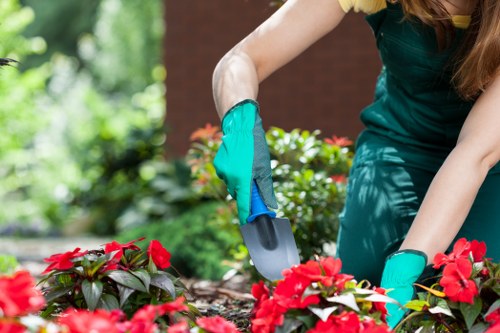
Autumn Maintenance
As autumn approaches, it's time to prepare your garden for the cooler months. Start by harvesting any remaining summer crops and clearing away spent plants. This helps prevent disease and pest infestations during the winter.
Mulching is an effective way to protect your soil and retain moisture. Apply a layer of mulch around your plants to insulate the roots and improve soil structure.
Pruning continues into autumn, with a focus on shaping plants and removing any that are not thriving. This sets the stage for a healthier garden in the spring.
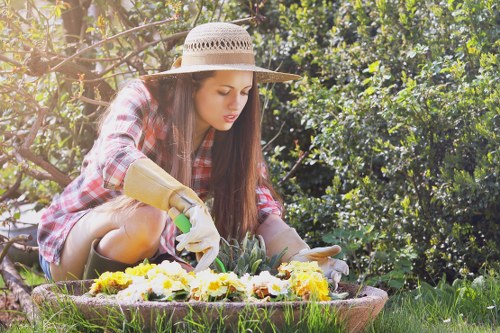
Winter Maintenance
Winter may seem like a dormant period for your garden, but proper garden maintenance in Chelsea can ensure a smooth transition into the next growing season. Start by protecting sensitive plants with frost covers or moving potted plants indoors.
Clear any snow from your garden paths to prevent damage and maintain accessibility. Additionally, use this time to plan your garden layout for the upcoming year, considering crop rotation and new plant varieties.
Tool maintenance is also important during winter. Clean and store your gardening tools properly to extend their lifespan and ensure they are ready for use when spring arrives.
Choosing the Right Plants for Chelsea Gardens
Selecting the appropriate plants is a cornerstone of effective garden maintenance in Chelsea. Chelsea's climate, characterized by mild winters and warm summers, supports a wide variety of plants, but careful selection can make maintenance easier and more successful.
Consider native plants that are well-adapted to the local climate and soil conditions. Native species typically require less water and are more resistant to local pests and diseases, reducing the need for chemical interventions.
Include a mix of perennials and annuals to ensure year-round interest and color in your garden. Perennials provide consistent returns each year, while annuals offer vibrant blooms and flexibility in garden design.
Flowering Plants
- Roses: Classic and versatile, roses thrive in Chelsea's climate with proper care.
- Lavender: Not only beautiful but also attracts pollinators, aiding in the health of your garden.
- Peonies: Known for their large, fragrant blooms, peonies are a popular choice for adding elegance.
Vegetables and Herbs
- Tomatoes: A staple in many gardens, tomatoes require full sun and regular watering.
- Basil: Perfect for adding flavor to dishes, basil thrives when planted near your vegetables.
- Spinach: A hardy green that can be harvested multiple times during the growing season.
Ground Cover and Foliage Plants
Ground cover plants help prevent soil erosion and reduce weed growth. They also add texture and depth to your garden design.
Foliage plants, with their varied leaf shapes and colors, provide visual interest even when flowers are not in bloom. Combining different plant types can create a dynamic and resilient garden ecosystem.
- Hostas: Ideal for shaded areas, hostas offer lush greenery and variety.
- Vinca: A versatile ground cover that blooms throughout the summer.
Essential Tools for Garden Maintenance
Having the right tools is vital for efficient garden maintenance in Chelsea. Quality tools not only make the job easier but also ensure that your garden receives the proper care it needs.
Investing in high-quality tools can save you time and effort. Proper maintenance of your tools, such as cleaning and sharpening, will extend their lifespan and keep them in optimal condition.
Basic Gardening Tools
- Pruning Shears: Essential for trimming and shaping plants.
- Garden Fork: Useful for turning soil and aerating garden beds.
- Hand Trowel: Perfect for planting and transplanting small plants.
Advanced Equipment
- Hose with Adjustable Nozzle: Ensures efficient watering without wasting water.
- Lawn Mower: Keeps your lawn neat and healthy.
- Compost Bin: Helps recycle organic waste into valuable fertilizer.
Soil Management and Fertilization
Healthy soil is the foundation of a thriving garden. Effective soil management practices are a key component of garden maintenance in Chelsea.
Regularly testing your soil can help determine its pH level and nutrient content, allowing you to make informed decisions about amendments and fertilizers.
Incorporating organic matter, such as compost or well-rotted manure, improves soil structure, enhances moisture retention, and promotes beneficial microbial activity.
Types of Fertilizers
- Organic Fertilizers: Derived from natural sources, they provide a slow release of nutrients and improve soil health.
- Inorganic Fertilizers: Offer a quick nutrient boost but should be used sparingly to avoid soil degradation.
- Compost: An excellent all-purpose fertilizer that enriches the soil with a variety of nutrients.
Amending the Soil
Depending on your soil type, you may need to add amendments to improve its fertility and structure. For example, sandy soils benefit from added organic matter to increase water retention, while clay soils may need sulfur or gypsum to enhance drainage.

Pest and Disease Management
Maintaining a healthy garden involves proactive pest and disease management. Effective strategies can minimize damage and reduce the need for chemical interventions.
Regularly inspecting your plants for signs of pests or diseases allows for early detection and more manageable treatment. Look for symptoms like discolored leaves, spots, or unusual growth patterns.
Implement integrated pest management (IPM) practices, which combine biological, cultural, physical, and chemical tools to control pests in an environmentally and economically sustainable way.
Common Pests in Chelsea Gardens
- Aphids: Small insects that suck plant sap, causing leaves to curl and distort.
- Slugs and Snails: Can cause significant damage to young plants by feeding on leaves and stems.
- Japanese Beetles: Known for their voracious appetite, they can defoliate entire plants quickly.
Natural Pest Control Methods
- Beneficial Insects: Introduce predators like ladybugs and lacewings to naturally control pest populations.
- Neem Oil: An organic pesticide that disrupts the life cycle of pests without harming beneficial insects.
- Barriers and Traps: Use physical barriers or traps to reduce pest numbers effectively.

Watering and Irrigation Strategies
Proper watering is a cornerstone of garden maintenance in Chelsea. Understanding the watering needs of your plants and implementing efficient irrigation systems can significantly impact the health and growth of your garden.
Overwatering can lead to root rot and other fungal diseases, while underwatering can cause plants to wilt and stunt their growth. Striking the right balance is key.
Efficient Irrigation Systems
- Drip Irrigation: Delivers water directly to the plant roots, minimizing evaporation and water waste.
- Sprinkler Systems: Suitable for larger garden areas but may require adjustments to ensure even coverage.
- Soaker Hoses: Ideal for garden beds, providing a slow and steady water supply.
Watering Techniques
- Deep Watering: Encourages deep root growth by supplying a significant amount of water less frequently.
- Mulching: Helps retain soil moisture and reduce the frequency of watering.
- Morning Watering: Watering early in the day reduces evaporation and allows plants to absorb moisture before the heat of the day.
Rainwater Harvesting
Collecting and using rainwater is an environmentally friendly way to water your garden. It reduces the reliance on municipal water and provides plants with naturally soft water, free from chemicals.
Implementing Rain Barrels
Installing rain barrels can capture runoff from your roof, storing it for use during dry periods. Ensure that your rain barrels have proper filtration to keep the water clean and free of debris.
Lawn Care in Chelsea
A well-maintained lawn can enhance the beauty of your Chelsea garden. Effective lawn care involves regular mowing, fertilizing, aerating, and weed control.
Choosing the right type of grass for Chelsea's climate ensures a lush and resilient lawn. Consider grasses that can withstand both the mild winters and warm summers typical of the area.
Mowing Techniques
- Regular Mowing: Keep your grass at the recommended height to promote healthy growth and prevent weeds from establishing.
- Sharp Blades: Ensure your mower blades are sharp to make clean cuts, reducing stress on the grass plants.
- Mowing Patterns: Change your mowing patterns regularly to prevent soil compaction and encourage grass to grow upright.
Fertilization and Aeration
Fertilizing your lawn provides essential nutrients that promote green, healthy grass. Spring and autumn are ideal times for lawn fertilization in Chelsea.
Aeration helps relieve soil compaction, allowing air, water, and nutrients to reach the grass roots more effectively. Use a lawn aerator to create small holes in the soil, enhancing overall lawn health.
Weed Control
Weeds compete with your grass for resources, so effective weed control is necessary. Use pre-emergent herbicides to prevent weed seeds from germinating and apply post-emergent herbicides to tackle existing weeds.

Pruning and Trimming
Proper pruning and trimming are essential for maintaining the shape and health of your plants. Regular pruning encourages new growth, improves air circulation, and reduces the risk of disease.
Different plants have specific pruning requirements, so it's important to understand the needs of each species in your garden. For instance, flowering shrubs may need pruning after they bloom, while fruit trees benefit from annual trimming.
Tools for Pruning
- Hand Pruners: Ideal for small branches and precise cuts.
- Pruning Saws: Suitable for thicker branches that hand pruners can't handle.
- Loppers: Perfect for cutting medium-sized branches with ease.
Pruning Techniques
- Thinning: Removes entire branches at their base to open up the plant.
- Heading: Cuts back the tips of branches to encourage bushier growth.
- Deadheading: Removes spent flowers to promote continuous blooming.
Trimming Hedges
Maintaining the shape of hedges requires regular trimming. Use hedge shears for a neat, uniform appearance, and trim during the growing season to keep your hedges dense and healthy.
Best Practices
Always cut at a slight angle to prevent water from sitting on the cut surface, which can lead to rot. Additionally, avoid cutting too much at once; instead, trim gradually to maintain the desired shape without stressing the plants.

Mulching for a Healthier Garden
Mulching plays a significant role in garden maintenance in Chelsea. It involves covering the soil with a layer of material to conserve moisture, suppress weeds, and improve soil quality.
There are various types of mulch, including organic options like wood chips, straw, and compost, as well as inorganic options like gravel and landscape fabric. Each type has its own benefits and is suited to different garden needs.
Benefits of Mulching
- Moisture Retention: Mulch helps retain soil moisture, reducing the need for frequent watering.
- Weed Suppression: A thick layer of mulch can prevent weed seeds from germinating, keeping your garden beds clean.
- Soil Improvement: Organic mulches decompose over time, adding valuable nutrients to the soil and improving its structure.
Applying Mulch
- Prepare the Soil: Remove any existing weeds and loosen the soil surface before applying mulch.
- Spread Evenly: Apply a 2-3 inch layer of mulch around your plants, ensuring it doesn't pile up against stems or trunks to prevent rot.
- Replenish as Needed: Organic mulches may need to be replenished periodically as they decompose.
Choosing the Right Mulch
Select a mulch that complements your garden's aesthetic and meets its functional needs. For example, wood chips provide a natural look and are excellent for perennial beds, while gravel is ideal for pathways and reduces maintenance.
Organic vs. Inorganic Mulch
Organic mulches benefit the soil by adding nutrients and improving its structure, but they may require more frequent replenishment. Inorganic mulches, on the other hand, are longer-lasting and require less maintenance but do not enhance soil fertility.

Composting and Waste Management
Composting is a sustainable practice that transforms garden waste into valuable organic fertilizer. Effective waste management contributes to healthy garden soil and reduces the environmental impact of your gardening activities.
By composting, you can recycle kitchen scraps, garden trimmings, and other organic materials, turning them into nutrient-rich compost that enhances soil fertility and structure.
Setting Up a Compost Bin
- Select a Location: Choose a shaded, well-ventilated area for your compost bin to maintain optimal decomposition conditions.
- Choose the Right Bin: Compost bins come in various sizes and materials. Select one that suits your garden space and the volume of waste you generate.
- Layering Materials: Alternate layers of green materials (like vegetable scraps) and brown materials (like dry leaves) to create a balanced compost pile.
Maintaining Your Compost
- Turn Regularly: Aerate the compost by turning it with a pitchfork or shovel to speed up the decomposition process.
- Monitor Moisture: Keep the compost moist but not soggy. If it's too dry, add water; if too wet, add more brown materials.
- Wait and Harvest: Depending on conditions, compost can be ready in a few months. Once it's dark and crumbly, it's ready to use in your garden.
Benefits of Composting
Composting reduces the need for chemical fertilizers, lowers greenhouse gas emissions by minimizing landfill waste, and improves soil health by adding organic matter and beneficial microbes.
Using Compost in Your Garden
Incorporate compost into your garden beds by mixing it with the existing soil. It enhances moisture retention, improves soil structure, and provides a slow-release source of nutrients for your plants.
Dealing with Common Garden Challenges
Gardening in Chelsea comes with its unique set of challenges, from unexpected weather patterns to pest invasions. Addressing these issues promptly ensures your garden remains healthy and beautiful.
Being proactive and prepared can help you manage potential problems before they escalate. Understanding the common challenges and their solutions is a crucial aspect of effective garden maintenance in Chelsea.
Weather-Related Issues
- Frost Damage: Protect sensitive plants during unexpected frosts by using frost covers or moving pots indoors.
- Heatwaves: Implement shading strategies and ensure adequate watering to help plants survive extreme heat.
- Heavy Rainfall: Improve drainage in garden beds to prevent waterlogging and root rot.
Pest Infestations
Rapid response to pest infestations can prevent substantial damage. Identify pests accurately and choose appropriate control methods, whether biological, cultural, or chemical.
Disease Prevention
- Proper Spacing: Avoid overcrowding plants to ensure good air circulation, reducing the risk of fungal diseases.
- Sanitation: Keep the garden clean by removing diseased plant material promptly.
- Resistant Varieties: Plant disease-resistant varieties to minimize the risk of infections.
Weed Management
Persistent weeds can outcompete your desired plants for resources. Employ a combination of manual removal, mulching, and appropriate herbicides to keep weeds under control.
Preventive Measures
Implement preventive strategies such as using landscape fabric, maintaining a thick mulch layer, and regularly inspecting your garden to catch weeds early.
Sustainable Gardening Practices
Adopting sustainable practices in your garden reduces environmental impact and promotes long-term health. Sustainable garden maintenance in Chelsea focuses on conservation, biodiversity, and resource efficiency.
From reducing water usage to choosing eco-friendly products, there are numerous ways to make your garden more sustainable without sacrificing beauty or functionality.
Water Conservation
- Rainwater Harvesting: As mentioned earlier, collecting rainwater is a great way to conserve water.
- Drought-Resistant Plants: Incorporate plants that require less water to reduce overall water consumption.
- Efficient Irrigation: Use drip irrigation and smart watering systems to minimize water waste.
Biodiversity Enhancement
Encouraging a diverse range of plants attracts various wildlife, including beneficial insects and pollinators. This natural biodiversity helps maintain ecological balance and reduces the need for chemical interventions.
Organic Practices
- Natural Fertilizers: Use compost and organic fertilizers to nourish your plants without harmful chemicals.
- Biological Pest Control: Introduce natural predators to manage pest populations effectively.
- Crop Rotation: Rotate plant families each season to prevent soil depletion and reduce disease risk.
Reducing Chemical Use
Avoiding excessive use of pesticides and herbicides protects beneficial organisms and minimizes environmental pollution. Opt for organic alternatives whenever possible.
Eco-Friendly Products
Select gardening products that are environmentally friendly, such as biodegradable pots, natural fertilizers, and non-toxic pest control solutions.
Professional Garden Maintenance Services in Chelsea
While DIY garden maintenance can be fulfilling, enlisting the help of professional services can ensure optimal results, especially for larger or more complex gardens.
Professional gardeners bring expertise, experience, and specialized equipment to handle a wide range of maintenance tasks efficiently. They can provide tailored solutions that address your garden's unique needs.
Benefits of Hiring Professionals
- Expertise: Professionals have in-depth knowledge of plant care, soil management, and pest control specific to Chelsea's environment.
- Time-Saving: Outsourcing maintenance tasks frees up your time to enjoy your garden without the stress of upkeep.
- Quality Results: Experienced gardeners ensure that all maintenance tasks are performed to the highest standards, enhancing your garden's beauty and health.
Services Offered
- Lawn Care: Including mowing, fertilizing, aerating, and weed control.
- Pruning and Trimming: Maintaining the shape and health of trees, shrubs, and hedges.
- Planting and Landscaping: Designing and implementing garden layouts, planting new flora, and installing hardscapes.
Choosing the Right Service Provider
When selecting a garden maintenance service in Chelsea, consider factors such as reputation, range of services, pricing, and customer reviews. Ensure they understand your vision and can meet your specific garden needs.
Questions to Ask
Prior to hiring, inquire about their experience with similar gardens, the products they use, and their maintenance approach to ensure alignment with your sustainability goals.
Conclusion & Call to Action
Effective garden maintenance in Chelsea transforms your outdoor space into a lush, vibrant, and sustainable haven. By following the best practices outlined in this guide—ranging from seasonal tasks and plant selection to soil management and sustainable practices—you can ensure your garden thrives throughout the year.
Whether you choose to maintain your garden yourself or seek professional assistance, the key to success lies in consistent care, informed decision-making, and a passion for cultivating beauty and health in your green spaces.
Ready to elevate your Chelsea garden? Contact us today to explore personalized garden maintenance services that cater to your unique needs and preferences. Let us help you create and maintain the garden of your dreams!